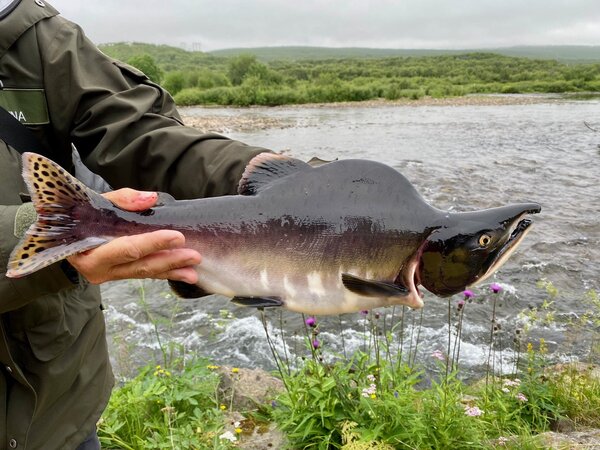Project
PINKTrack

Co-ordinated environmental DNA (eDNA) surveillance programme for pink salmon in the European Union.
The project studies the spread of invasive pink salmon in European inland waters using environmental DNA (eDNA). It aims to develop a warning system and support management measures to protect native species.The method development & work is closely intertwined with overlapping project objectives of the DCF data collection program.
Background and Objective
The pink salmon (Oncorhynchus gorbuscha) is originally native to river systems that flow into the North Pacific, the Arctic, and the Bering Sea between Siberia and Alaska. Similar to Atlantic salmon, it spawns from late summer to mid-autumn in freshwater streams, rivers, and intertidal areas but migrates to the sea in spring to spend its adult life in the open ocean. Pink salmon return to rivers to spawn after spending just one winter at sea and die after spawning. This means that populations typically have a two-year life cycle, returning to rivers every other year and appearing in odd-year or even-year populations.
In 2017, an unprecedented occurrence of pink salmon was recorded in countries of the European and North American Atlantic region, where they have since returned in every odd year (2019, 2021, and 2023). In Germany, few specimens of this species have also been detected in the river basin districts of the Rhine, Weser, Elbe, and Eider. However, it must be assumed that there is a significant number of unreported fish.
In anticipation of the possible re-occurrence of this non-native fish species in 2023, the Thünen Institute of Fisheries Ecology began efforts to monitor the presence of pink salmon in key catchments throughout Germany. Since 2024, the Thünen Institute of Fisheries Ecology has also been involved in PINKTrack, an EU-funded collaborative project supported by the North Atlantic Salmon Conservation Organization (NASCO).
The PinkTrack project aims to develop and implement a standardized protocol for environmental DNA (eDNA) sampling to monitor the spread of invasive pink salmon in EU member states. The methodology includes the establishment of an eDNA sampling program to detect pink salmon and track their spatiotemporal distribution, using early warning systems for national monitoring programs. The project is divided into several work packages, including the development of standardized sampling protocols, workshops for protocol dissemination, and project coordination. Key areas of focus are detection accuracy and the creation of a sample repository for future assessments.
Approach
- WP1 — eDNATrack: Development of standardised protocols for eDNA sampling for the detection of pink salmon in routine national monitoring programmes.
- WP2 — SurveillTrack: Establishment an eDNA sampling programme for detection of pink salmon to elucidate spatiotemporal patterns of spread and to provide an 'early warning system' for national monitoring programmes.
- WP3 — ProjectTrack: Organisation of project workshops to discuss protocol development, disseminate results, review outputs, promote adoption by national monitoring programmes, etc.
- WP4 — Project Management & Co-ordination
The following EU jurisdictions will participate in the project:
- Denmark
- Finland
- France
- Germany
- Ireland
- Spain
- Sweden
The following areas outside EU will participate in the project:
- Norway
PINKTrack is funded by the European Maritime, Fisheries and Aquaculture Fund (EMFAF) of the EU to run from November 2023 to October 2026.
Thünen-Contact

Involved Thünen-Partners
Involved external Thünen-Partners
-
Swedish University of Agricultural Science - SLU
(Uppsala, Lysekil, Schweden) -
Greenland Institute of Natural Resources (GINR)
(Nuuk, Grönland) - Danish Technical University (DTU)
(Kopenhagen, Hirtshals, Charlottenlund, Dänemark) - Inland fisheries Ireland
(Dublin, Irland) -
University College Dublin
(Dublin, Irland) - Natural Resources Institute Finland (LUKE)
(Helsinki, Mikkeli, Jokioinen, Vanda, Finnland) - Norwegian Institute for Nature Research (NINA)
(Trondheim, Norwegen) - Institut national de recherche pour l’agriculture, l’alimentation et l’environnement (INRAE)
(Paris, Toulouse, Montpellier, Avignon, Ivry-sur-Seine, Clermont-Ferrand, Rennes, Thiverval-Grignon, Dijon, Orleans, Bordeaux, Pierroton, Frankreich)
Funding Body
-
EU - European Maritime, Fisheries and Aquaculture Fund of the European Union (EMFAF)
(international, öffentlich)
Duration
11.2023 - 10.2026

Supported by the European Maritime, Fisheries and Auaculture Fund of the European Union (EMFAF).

![[Translate to English:] [Translate to English:]](/media/_processed_/2/9/csm_Embryo-Exp_Gelege_9F_dpf5-200513111619_c8534a8199.jpg)
![[Translate to English:] [Translate to English:]](/media/_processed_/2/9/csm_Embryo-Exp_Gelege_9F_dpf5-200513111619_9027994d44.jpg)











